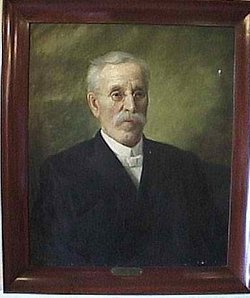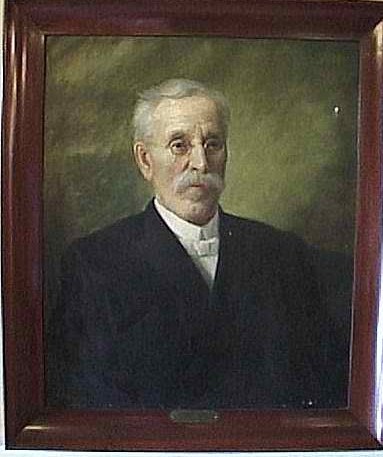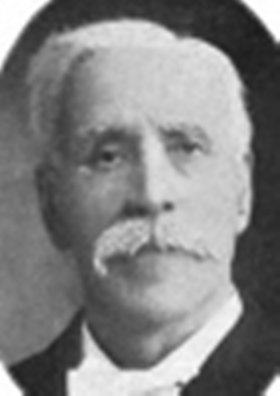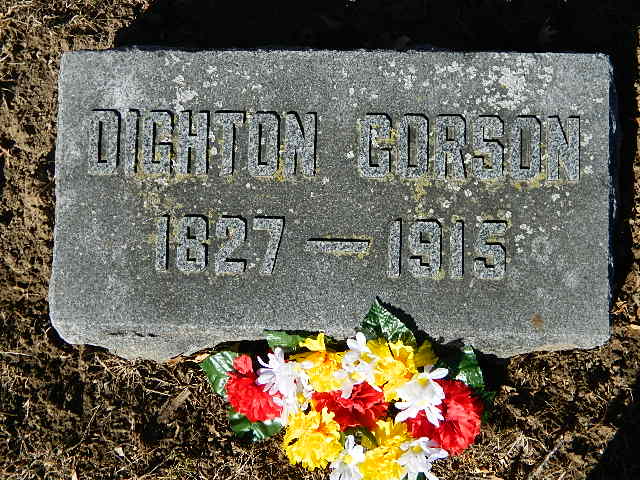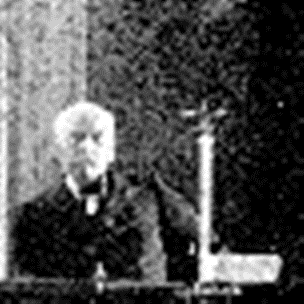1850 census at Canaan, Somerset, Maine
dwelling in the household of his mother.
Occupations - Attorney general;
Chief Justice to the Supreme Court
of South Dakota.
Dighton married
1] on 20 October 1855
at Bangor, Penobscot, Maine
Martha E. GOWEN
{born - 27 April 1836
at Shapleigh, York, Maine
daughter of John GOWEN and Martha EMERY}.
Dighton and Martha were the parents of; Ralph.
Last record of Martha is in the 1875 directory at San Francisco City in California dwelling in the household of Lucius Edwards BULKELEY.
Dighton {Age 33} is recorded on the 1860 census at Milwaukee, Milwaukee, Wisconsin.
Martha {Age 24) is recorded on the 1860 census at Bangor, Penobscot, Maine dwelling
in the household of her sister, Roxanna Smith.
2] on 22 May 1882 in South Dakota
Elizabeth BASSLER.
DAILY CAPITAL JOURNAL - 7 & 10 May 1915:
************************************
Dighton Corson bequeated to his son, Ralph E. Corson $3,000.00 and his hunting case watch. Also $250.00 to the town of Canaan in Maine for the care of the Corson family graves.
There were several other legacies, and the remainder of his estate left to his widow.
The arrangements are to send his remains
to Leavenworth, Kansas for interment.
***********************************
HISTORY OF DAKOTA TERRITORY:
****************************
In the death of Judge Dighton Corson on the 7th of May, 1915, South Dakota lost one who up to that time had been her oldest living lawyer and one whose life record constitutes an integral chapter in the history of the state. Of him it was said: "The town is better, the
state is better, and the world is better for his having lived. To know him was to love him." His friends will miss him, but the memory of his sweet and beautiful life, of his sincerity
and simplicity, will not be forgotten.
Dighton had the respect of the bar of South Dakota to such a degree as no other member of the state legal fraternity ever enjoyed.
His manner, his make-up and his everyday
life were such as made him stand out preeminently as a distinguished gentleman,
an able scholar and a citizen far above the average. His cool, deliberate and unimpassioned demeanor marked him in every walk of life as one who would be respected by any and every class of citizens, and his presence in any body of men or social gathering always elicited respectful admiration. His ideals always reflected something for the betterment of mankind. His desires were constantly in the interest of humanity, the community, and his family. His personal wants and wishes were not a burden imposed on others, and in all his eventful experience he looked upon life and acted his part as a philosopher. In all his political and official life as well as his personal existence he enjoyed the distinction of being a man above reproach and with no one to charge him with dishonesty or suggest duplicity or failure to keep his word. During all of his long service as a judge it is confidently asserted that he never uttered one discourteous word to any of his associates on the bench or to any member of the bar, nor can any opinion be found wherein the contentions of counsel were not treated with due courtesy and consideration. It truly may be said of him that in his life, his conduct and his conversation he always displayed the qualities of a cultured gentleman.
At the time of his death Mrs. Corson showed her unselfish devotion, especially during the closing years of his life.
He attended the public schools of Waterville
in Maine, and prepared for college but was denied the advantage of a college course.
He entered the study of law at Waterville
and later continued his preparation for the profession at Bangor in Maine, passing the examination which secured him admission
to the bar in 1853.
Coming west in the same year, he settled in Milwaukee, Wisconsin, where he practiced
until 1861,
The county of Corson in South Dakota was named for him.
*******************************************
TAPESTRIES OF LIFE - Mark de Bry:
Whatever fortunes accompany one through life, they smiled on Dighton Corson. Not that he was given any special advantage, in fact. when he was unable to attain a formal law school education, he was schooled and mentored in a law office until he passed the Bar in Maine. (1) This is but one example as his long life unfolded, where it is seen he made his own way, forged his own opportunities, molded his own future and earned his own well-deserved reward. As a result, he reached the pinnacle of professional achievement as South Dakota's first Chief Justice of its new State Supreme Court. As with so many of his 19th century American contemporaries blessed with a magical combination of opportunity and innate talent, Dighton Corson moved west with the growing Republic. He both found---and made---the opportunities he sought. He was on the financial, legal and leadership frontiers of his nation time after time. Deep in the mix of America's "westering" excitement, he saw opportunities from Maine to California---and frontier lawlessness in between---
and brought order and justice to both. Few men or women of his day accomplished as much. In just a few years as a young lawyer, he demonstrated judgments sufficient to be twice elected as District Attorney, first in Wisconsin and then in Nevada. All the while, he maintained a private law practice that specialized in mining law. Then, near the end of his remarkable legal career, he was called upon to co-author the new Constitution of the state of South Dakota before being appointed its first Chief Justice.
***********************************
Bio from "History of South Dakota" by Doane Robinson, Vol. I (1904), p 903.
DIGHTON CORSON, judge of supreme court, native of Somerset county, Maine, educated at Waterville. Came to Wisconsin at early period and was member of Wisconsin legislature in 1857, and district attorney for Milwaukee county in 1858. Afterwards settled in Nevada and was for many years district attorney at Virginia City. Came to Black Hills in 1876. Was member of constitutional conventions of 1883 and 1889. Elected supreme judge at statehood and has continued in the position.
Pierre Weekly Free Press, Pierre, Hughes, SD, 13 May 1915, page 4:
"JUDGE CORSON DEAD. Judge Dighton Corson of this city, first presiding judge of the South Dakota Supreme Court and for many years up9on the bench, died at his home in Pierre Friday, the cause of death was being old age.
Judge Corson was born in Maine in 1827. He practiced law in Milwaukee for a time and then went to Nevada and later came to this state, locating at Deadwood. He was elected to the supreme bench in 1889.
The death of Jude Corson, coming after a long and well spent life, is mourned by Dakotans and especially by resident who were here in the early days.
Judge Corson served the people of three states with a high degree of ability and was a member of the state legislature of Wisconsin in 1856, and was district attorney at Virginia City, Nevada.
He came to Dakota Territory, settling at Deadwood in 1876, and during the 39 years that have elapsed he was a model citizen.
The remains were taken from the home on Prospect Avenue Sunday morning at 9 o'clock to the Capitol, where they lay in state from 10 a.m. until the hour of service, the honorary and active pallbearers escorting the remains from the home.
Impressive funeral services were held in the Rotunda at the capitol at 1:30 o'clock Sunday afternoon.
Hon. Judge Dick Haney of Mitchell, an intimate friend of the deceased, delivered a very impressive address. The funeral services were conducted by Rev. O.O. Smith of the Congregational church and Rev. H.L. Russell of the Episcopal church.
A male quartette gave several selections, which were favorite hymns of the deceased.
The north side of the rotunda was a massive bower of flowers and foliage, the tokens of the many friends of the family.
The active pall bearers were L.E. Gaffy, P.F. McClure, H.R. Horner, C.H. Burke, J.L. Lockart and L.L. Stephens. The honorary pall bearers were the judges of the Supreme Court.
The remains, accompanied by Mrs. Corson and Mr. and Mrs. W.S. Walker, were taken to Leavenworth, Lan., for burial."
1850 census at Canaan, Somerset, Maine
dwelling in the household of his mother.
Occupations - Attorney general;
Chief Justice to the Supreme Court
of South Dakota.
Dighton married
1] on 20 October 1855
at Bangor, Penobscot, Maine
Martha E. GOWEN
{born - 27 April 1836
at Shapleigh, York, Maine
daughter of John GOWEN and Martha EMERY}.
Dighton and Martha were the parents of; Ralph.
Last record of Martha is in the 1875 directory at San Francisco City in California dwelling in the household of Lucius Edwards BULKELEY.
Dighton {Age 33} is recorded on the 1860 census at Milwaukee, Milwaukee, Wisconsin.
Martha {Age 24) is recorded on the 1860 census at Bangor, Penobscot, Maine dwelling
in the household of her sister, Roxanna Smith.
2] on 22 May 1882 in South Dakota
Elizabeth BASSLER.
DAILY CAPITAL JOURNAL - 7 & 10 May 1915:
************************************
Dighton Corson bequeated to his son, Ralph E. Corson $3,000.00 and his hunting case watch. Also $250.00 to the town of Canaan in Maine for the care of the Corson family graves.
There were several other legacies, and the remainder of his estate left to his widow.
The arrangements are to send his remains
to Leavenworth, Kansas for interment.
***********************************
HISTORY OF DAKOTA TERRITORY:
****************************
In the death of Judge Dighton Corson on the 7th of May, 1915, South Dakota lost one who up to that time had been her oldest living lawyer and one whose life record constitutes an integral chapter in the history of the state. Of him it was said: "The town is better, the
state is better, and the world is better for his having lived. To know him was to love him." His friends will miss him, but the memory of his sweet and beautiful life, of his sincerity
and simplicity, will not be forgotten.
Dighton had the respect of the bar of South Dakota to such a degree as no other member of the state legal fraternity ever enjoyed.
His manner, his make-up and his everyday
life were such as made him stand out preeminently as a distinguished gentleman,
an able scholar and a citizen far above the average. His cool, deliberate and unimpassioned demeanor marked him in every walk of life as one who would be respected by any and every class of citizens, and his presence in any body of men or social gathering always elicited respectful admiration. His ideals always reflected something for the betterment of mankind. His desires were constantly in the interest of humanity, the community, and his family. His personal wants and wishes were not a burden imposed on others, and in all his eventful experience he looked upon life and acted his part as a philosopher. In all his political and official life as well as his personal existence he enjoyed the distinction of being a man above reproach and with no one to charge him with dishonesty or suggest duplicity or failure to keep his word. During all of his long service as a judge it is confidently asserted that he never uttered one discourteous word to any of his associates on the bench or to any member of the bar, nor can any opinion be found wherein the contentions of counsel were not treated with due courtesy and consideration. It truly may be said of him that in his life, his conduct and his conversation he always displayed the qualities of a cultured gentleman.
At the time of his death Mrs. Corson showed her unselfish devotion, especially during the closing years of his life.
He attended the public schools of Waterville
in Maine, and prepared for college but was denied the advantage of a college course.
He entered the study of law at Waterville
and later continued his preparation for the profession at Bangor in Maine, passing the examination which secured him admission
to the bar in 1853.
Coming west in the same year, he settled in Milwaukee, Wisconsin, where he practiced
until 1861,
The county of Corson in South Dakota was named for him.
*******************************************
TAPESTRIES OF LIFE - Mark de Bry:
Whatever fortunes accompany one through life, they smiled on Dighton Corson. Not that he was given any special advantage, in fact. when he was unable to attain a formal law school education, he was schooled and mentored in a law office until he passed the Bar in Maine. (1) This is but one example as his long life unfolded, where it is seen he made his own way, forged his own opportunities, molded his own future and earned his own well-deserved reward. As a result, he reached the pinnacle of professional achievement as South Dakota's first Chief Justice of its new State Supreme Court. As with so many of his 19th century American contemporaries blessed with a magical combination of opportunity and innate talent, Dighton Corson moved west with the growing Republic. He both found---and made---the opportunities he sought. He was on the financial, legal and leadership frontiers of his nation time after time. Deep in the mix of America's "westering" excitement, he saw opportunities from Maine to California---and frontier lawlessness in between---
and brought order and justice to both. Few men or women of his day accomplished as much. In just a few years as a young lawyer, he demonstrated judgments sufficient to be twice elected as District Attorney, first in Wisconsin and then in Nevada. All the while, he maintained a private law practice that specialized in mining law. Then, near the end of his remarkable legal career, he was called upon to co-author the new Constitution of the state of South Dakota before being appointed its first Chief Justice.
***********************************
Bio from "History of South Dakota" by Doane Robinson, Vol. I (1904), p 903.
DIGHTON CORSON, judge of supreme court, native of Somerset county, Maine, educated at Waterville. Came to Wisconsin at early period and was member of Wisconsin legislature in 1857, and district attorney for Milwaukee county in 1858. Afterwards settled in Nevada and was for many years district attorney at Virginia City. Came to Black Hills in 1876. Was member of constitutional conventions of 1883 and 1889. Elected supreme judge at statehood and has continued in the position.
Pierre Weekly Free Press, Pierre, Hughes, SD, 13 May 1915, page 4:
"JUDGE CORSON DEAD. Judge Dighton Corson of this city, first presiding judge of the South Dakota Supreme Court and for many years up9on the bench, died at his home in Pierre Friday, the cause of death was being old age.
Judge Corson was born in Maine in 1827. He practiced law in Milwaukee for a time and then went to Nevada and later came to this state, locating at Deadwood. He was elected to the supreme bench in 1889.
The death of Jude Corson, coming after a long and well spent life, is mourned by Dakotans and especially by resident who were here in the early days.
Judge Corson served the people of three states with a high degree of ability and was a member of the state legislature of Wisconsin in 1856, and was district attorney at Virginia City, Nevada.
He came to Dakota Territory, settling at Deadwood in 1876, and during the 39 years that have elapsed he was a model citizen.
The remains were taken from the home on Prospect Avenue Sunday morning at 9 o'clock to the Capitol, where they lay in state from 10 a.m. until the hour of service, the honorary and active pallbearers escorting the remains from the home.
Impressive funeral services were held in the Rotunda at the capitol at 1:30 o'clock Sunday afternoon.
Hon. Judge Dick Haney of Mitchell, an intimate friend of the deceased, delivered a very impressive address. The funeral services were conducted by Rev. O.O. Smith of the Congregational church and Rev. H.L. Russell of the Episcopal church.
A male quartette gave several selections, which were favorite hymns of the deceased.
The north side of the rotunda was a massive bower of flowers and foliage, the tokens of the many friends of the family.
The active pall bearers were L.E. Gaffy, P.F. McClure, H.R. Horner, C.H. Burke, J.L. Lockart and L.L. Stephens. The honorary pall bearers were the judges of the Supreme Court.
The remains, accompanied by Mrs. Corson and Mr. and Mrs. W.S. Walker, were taken to Leavenworth, Lan., for burial."
Inscription
DIGHTON CORSON
1827 - 1915
Gravesite Details
Compiled from research by Mark R. de BRY
Family Members
Sponsored by Ancestry
Advertisement
Records on Ancestry
Advertisement
